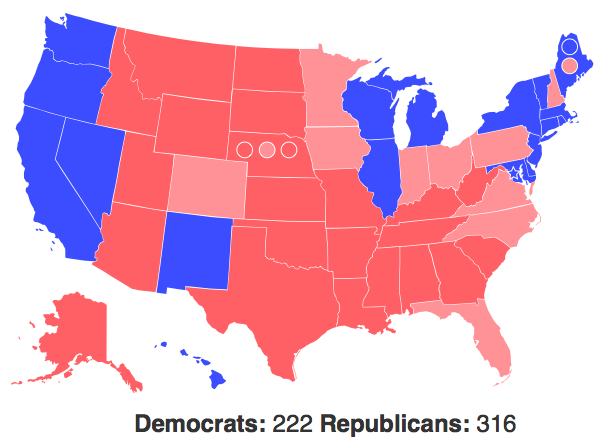Economics projects a 94 EV defeat for Barack Obama
Over at the American Enterprise Institute, James Pethokoukis modeled the economy and the effect of the economy on the 2012 elections. He calculated what unemployment would look like under 28 different scenarios, varying both job and labor force growth rates to cover the range of possibilities, ad the results look bad if there’s any sort of return to the previous trend, should job growth rates not grow sharply.
Even worse for the President, Pethokoukis applied a model by Ray Fair to guess the resulting share of the vote Barack Obama will win based on likely GDP growth rates. Pethokoukis calls the resulting prediction a “close race,” but it actually isn’t. Using Swingometer and some simple math, I think the prediction is one of a nearly 100 EV win for the Republican nominee.
Pethokoukis uses Fair’s model to project that the Obama/Biden ticket should get 47.8% of the two-party popular vote in November, if the economy sees 2% growth this year. In 2008, the McCain/Palin ticket received 46.3% of the two-party vote, meaning Obama had a 7.4 point lead. For Obama to get only 47.8% would give the Republican ticket a 4.4 point lead in the two-party vote, meaning the prediction is of an 11.8 point swing from Democrats to Republicans from 2008 to 2012.
The Swingometers at Unlikely Voter happen to work with swings in the two party vote. We can take that 11.8 and plug it right in. The result is not particularly close, in my opinion:

That’s right: Using the Pethokoukis figures and plugging them into my Swingometer, 2% GDP growth predicts a 316-222 Electoral College victory for the Republicans. Republicans swing Nebraska’s second district, Colorado, Minnesota, Iowa, Indiana, Ohio, Pennsylvania, Virginia, North Carolina, Florida, New Hampshire, and even Maine’s second district. I don’t call that a close contest at all. 94 EVs would be the biggest Republican win since 1988.
We can’t really expect old-fashioned blowouts anymore, though. In 1956, 1964, and 1980, the parties and the nation were less polarized on the issues and on philosophy. There were conservative Democrats and Rockefeller Republicans. Republicans and Democrats could easily find themselves preferring the other party’s candidate. Now, though, conservative Democrats are gone, the Rockefeller Republicans are gone, and the nation is polarized. Democrats aren’t going to win Texas and Republicans aren’t going to win California.
So a nearly 100 EV win I don’t call particularly close on the modern scale. Certainly, in this scenario, we’re not having a late night wondering who won.
Comments are closed.